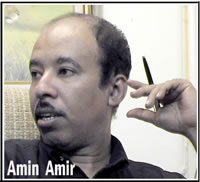By Kamil, A. A
 |
Legendary Somali Cartoonist Amin Amir - Cursed and intimidated by UIC
|
Criticizing Islamic courts in Somalia! Can you dare it? In case you are courageous enough, be aware! You may receive numerous lashes if you do so in areas controlled by the courts. Otherwise, in the Diaspora or other regions of Somalia, you may receive “cursing” as happened to the legendary Somali cartoonist Amiin Amir. As a matter of fact, every objective individual is expected to be reluctant in criticizing Union of the Islamic Courts (UIC) that claim adherence to the Islamic principles. Particularly, criticizing UIC is pointless after they succeeded to eliminate notorious warlords supported by US, restored relative security in Mogadishu, opened international airport and sea port in Mogadishu; and called to defend motherland from Ethiopia. These UIC’s actions are very popular to the masses dismayed by the ineffective TFG in Baidoa. However, critics of the UIC see the issue from different perspectives and argue the following points.
Firstly, the objective of UIC is not to establish system of governance in Somalia. Sustainable system of governance for Somalia should be participatory, democratic, law abiding, and providing security and basic social services. Looking into the huge areas from under the rule of the UIC, only military administration organized on clan basis of “Islamic courts” is evident. This loose system which networks the courts dictates the type of governance in its own way and applies Shari’a law in accordance with the Ijtihad of its sheikh leader. Therefore, UIC do not necessarily work to realize national aspirations for reconstituting Somali state. Instead, they represent a revolting and angry Islam that is emotional and irrational, monopolizing political power illegitimately. Courts represent extraordinary force capable of devastation and ruination but unable to rebuild Somali
state institutions.
Secondly, UIC is not wholeheartedly willing to reconcile with the TFG. All their programs and actions show that they are poised to crash the TFG by any means necessary. A clear proof is the outcome of the second Khartoum meeting between the TFG delegation and UIC in which UIC limited the agenda on security. Security for the UIC means no lifting of arm’s embargo and no need for foreign troops. This makes TFG susceptible and easy to prey by the stronger Islamic militia and pushes TFG to seek Ethiopian help. Courts refused so far to speak about political settlement and national reconciliation agenda at all. They consider these negotiations as tactical diversion and public relation endeavour while consolidating power.
Thirdly, UIC is divisive force in Somalia. They divide the Somali community into “good” and “bad” Muslims. Obviously, good Muslims are those who support UIC while others are the “bad” Muslims, worthy to be labelled as “hypocrites” or “non-believers”. The non-believer category should be dealt with as the enemy of the “Islamic revolution” deserving UICs wrath in its different forms and degrees. The TFG, the Puntland administration and the Somaliland, fall in this category. Also, this includes civil society organizations, Sufi brotherhoods, clan elders, politicians and every organized group in Somalia. A divisive force can never realize national agenda for statehood that requires mobilization of all people for a single purpose and direction.
Fourthly, UIC provokes conflict with the neighbouring countries. Their superficial Islamic rhetoric causes panic in the Horn of Africa and their advocacy for Jihad against Ethiopia in particular while they are supported by Eritrea. This policy gives the impression that Eritrean-Ethiopian boarder war was transferred to Somalia and UIC is just instrumental for such
Eritrean strategy. Critics of the UIC believe that it is imprudent undertaking to play regional politics in the Horn of Africa. They consider invoking historical conflict with Ethiopia at this time is too dangerous since the existence of the Republic of Somalia is in great risk.
Fifth, UIC resembles international terrorism in their slogans, banners and actions. Burned national Somali flag in Kismayo, a national symbol adored by all Somalis, had inflamed anger and dismay among Somali masses. UIC are very similar to the radical Islamic groups in Afghanistan, Algeria and Iraq. The fine touch of Al-Qa’ida is evident in its organizational structure, names and ways of training and waging battles. Their unambiguous affinity with Al-Qaida creates eventually greater setback for Somalia for years to come and attracts world attention to the Somali plight. It will eventually place Somalia in a stage for armed conflict in the Horn of Africa as well as
a theatre for international war on global terrorism.
Kamil, A. A.
[email protected]
| The opinions contained in this article are solely those of the writer, and in no way, form or shape represent the editorial opinions of "Hiiraan Online" |